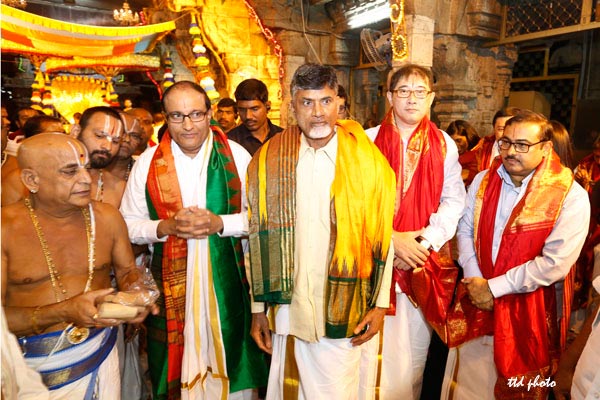“Hindu Dharma Parirakshana Trust” is not an extended arm of Vishwa Hindu Parishad. Nor it has anything to do with RSS or BJP. But, it was part of Endowments Department of Government of Andhra Pradesh. Its existence came to the notice of general public when its secretary Dr Ch. Vijaya Raghavacharyulu sent a notification to all temples (Hindu ones, obviously) instructing them not to create a festive atmosphere in temples on the New Year eve.
The notification starts by reminding that our country got independent long ago but we still are following practices instilled by the English. Highlighting the importance of Ugadi, including that of the famous “Vapa Pachchadi” {made of tender mangoes, Neem flowers, fresh Jaggery, Tarmarind and Salt – a combination of all tastes to expect in the New Year}, the notification questions money donated by devotees being spent on 1st January – a date that has nothing to do with Vedic practices. Pujaris wishing devotees on this day and creating a festive atmosphere was frowned upon and they were instructed to stop these practices.
As expected, there were some who criticized this decision while some welcomed it. In fact, there was no other single decision by Chandrababu Naidu government that evoked much debate in public for a recently.
If someone has interpreted this episode as – The Andhra Government is against celebrating and exchanging greetings on New Year, they are horribly wrong. This Andhra Government notification is cleverly worded to avoid any controversies (it is another matter, we can create controversy out of nothing) and was specific to Hindu temples celebrating a day that has nothing to do with these temples in the first place.
“Can’t I go to temple on this day?” many asked. Why not? Who prevented them from doing so? And more importantly, who can? If one wants to go to temple and pray on 1st January, they can very well do it. Then, what is the government is trying to convey?
The Government just wanted to stop over-commercializing of the spiritual temples. Many renowned temples are opened from midnight onwards – as the first day in Gregorian calendar starts from that midnight. As mentioned in the notification, lakhs of rupees are spent on decorating the temple – the money that is donated by devotees.
Some questioned why the Prime Minister and the President exchange New Year greetings with world leaders on this day or not? Well, they certainly do. After all, they represent the offices they occupied.
One gentleman questioned if Ugadi was really so great, why other nations can greet us on this day? Well, for someone else to respect us, first we should respect ourselves. The day we respect and follow our customs (not blindly but after understanding them), others too will respond positively. In the recent years, the practice of greeting Indians on Deepavali has started. The day we understand the reason behind various customs and practices of our forefathers, we will be in a position to explain the practices – with reason. Should we not give a try?
Taking a cue from this notification, Advocate A. Ashvathaman filed a writ petition before Madras High Court to direct the Hindu Religious & Charitable Endowments department of Tamilnadu so that none of the temples under its control are opened on New Year. In his petition Ashvathaman explained that Shaivite temples are opened during nights only on Maha Shivaratri and Vaishnava temples are opened at midnight on Vaikuntha Ekadashi. He said that Agama Shastras state that temples be closed after artha-jama puja at 9PM and opened only during Brahmi muhurtam – after 4:30AM.
There were some who branded the Andhra government as pushing the Hindutva agenda. Funnily, they fail to explain what business a ‘secular government’ has with temples that it can’t leave control over them. Similarly, the supporters of this decision branded the ones opposing it, as people in colonial hangover. And, they can’t answer why they too remained in the same hangover till date. In both Telugu speaking states, the practice of ‘Mandala Deeksha’ of various deities too has increased in the last few years. Public celebrations of Dasara stopped resembling native culture and customs and became only orchestras and filmy dance shows, it is time to remind them to bring back Karnataka music, Bharata Natyam, Kuchipudi, Hari katha, Burrakatha, Yakshagana, Kolatam (Dandiya) etc. In the north, the practice of garish Jagratas which has as much to do with spirituality as Illayraja has to do with Rugby, is also a grim reminder of what is becoming of our Dharma.
In light of our expertise in forgetting our traditional practices and adapting new practices, somehow I feel the notification by the Andhra Government would serve as a gentle reminder to us – to pause in our race and reflect for a moment where we are headed.
